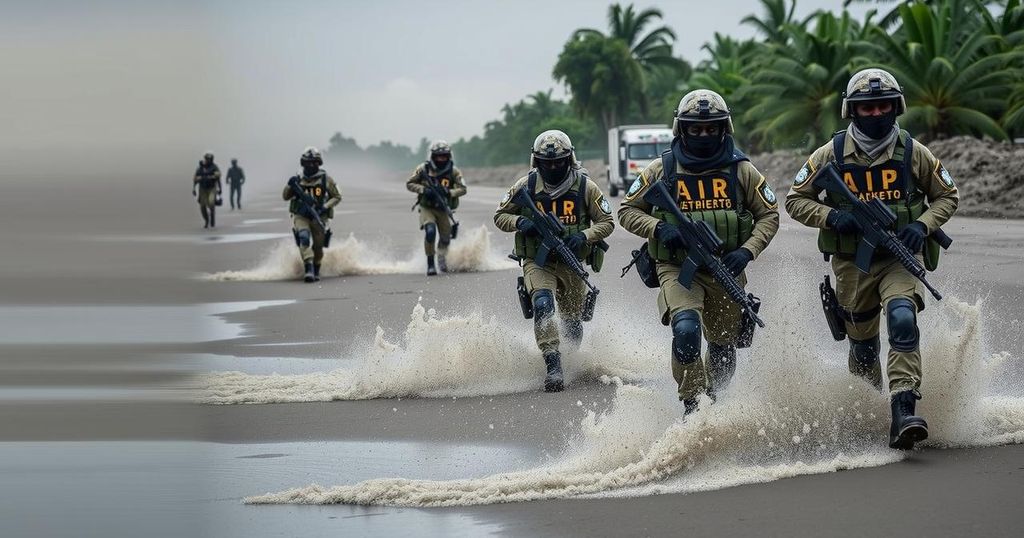Global news
AFRICA, ALI, ALINE KASEREKA, AP, ASSOCIATED PRESS, BAR, CIVIL WAR, CONGO, DISPLACEMENT, FELIX TSHISEKEDI, HENRY PACIFIQUE, HUMANITARIAN, HUMANITARIAN CRISIS, KASEREKA, KIVU, LUBERO, M23, NORTH AMERICA, PAUL KAGAME, RWANDA, SEXUAL VIOLENCE, THE ASSOCIATED PRESS, U. N, UNITED NATIONS, UNITED STATES
Jamal Walker
0 Comments
Escalation of Fighting in Eastern Congo Ahead of Critical Peace Talks
Fighting escalates in eastern Congo as the army clashes with M23 rebels ahead of peace talks. The army accuses M23 of civilian killings, while the group denies the claims. With over 7 million displaced, the humanitarian crisis deepens, and skepticism surrounds upcoming diplomatic negotiations between Congo and Rwanda.
Fighting between the Congolese army and the M23 rebel group has escalated in eastern Congo in anticipation of peace talks scheduled for Sunday. The Congolese army accused the M23 of murdering 12 civilians in the Lubero territory of North-Kivu, a claim that was dismissed as government propaganda by an M23 spokesperson. This conflict involves one of over 100 armed groups competing for control in the mineral-rich region, contributing to one of the largest humanitarian crises globally, with over 7 million displaced individuals.
Both the Congolese government and the United Nations have alleged that Rwanda is providing support to the M23, a claim that Rwanda disputes. However, Rwanda has acknowledged the presence of its troops and missile systems in eastern Congo to protect its national security amidst rising Congolese military presence near the border. Recent U.N. estimates suggest that as many as 4,000 Rwandan forces may be present in Congo.
In the previous month, delegates from Congo and Rwanda discussed the conditions for the withdrawal of Rwandan forces from eastern territories. Following a ceasefire agreement signed by Congo and M23 in July that took effect in August, hostilities have resumed, prompting U.S. concerns regarding violations of the ceasefire by the rebels. As the presidents of Congo and Rwanda prepare to meet in Angola—where mediation efforts are ongoing—local voices echo the urgent need for resolution.
A resident from Lubero, Aline Kasereka, articulated the dire situation, stating, “We are tired of the war; every day we move, and we do not know in which country we are anymore.” With skepticism surrounding the upcoming summit’s outcomes, Kivu Security Barometer analyst Henry Pacifique noted that both nations appear to be pointing fingers at each other to justify future infringements on the agreement.
The conflict in eastern Congo is characterized by a multitude of armed groups competing for control over valuable minerals, resulting in brutal violence and widespread displacement. The M23 rebel group emerged amidst accusations of support from Rwanda, straining relations between the two countries. The international community, including the United Nations and the United States, has expressed grave concern over the humanitarian implications and the ongoing violations of ceasefire agreements amid failed diplomatic efforts. Recent developments suggest that despite previous agreements, fighting has intensified, necessitating urgent resolutions.
In summary, the ongoing conflict in eastern Congo remains critical as fighting intensifies ahead of pivotal peace talks. The humanitarian crisis continues, with millions displaced and allegations of external support complicating the situation. Despite prior ceasefire agreements and diplomatic discussions, the prospects for a resolution appear uncertain, reflecting deep-seated grievances between involved parties. Local populations, like Aline Kasereka, are pleading for urgent negotiations to restore peace and stability.
Original Source: apnews.com




Post Comment